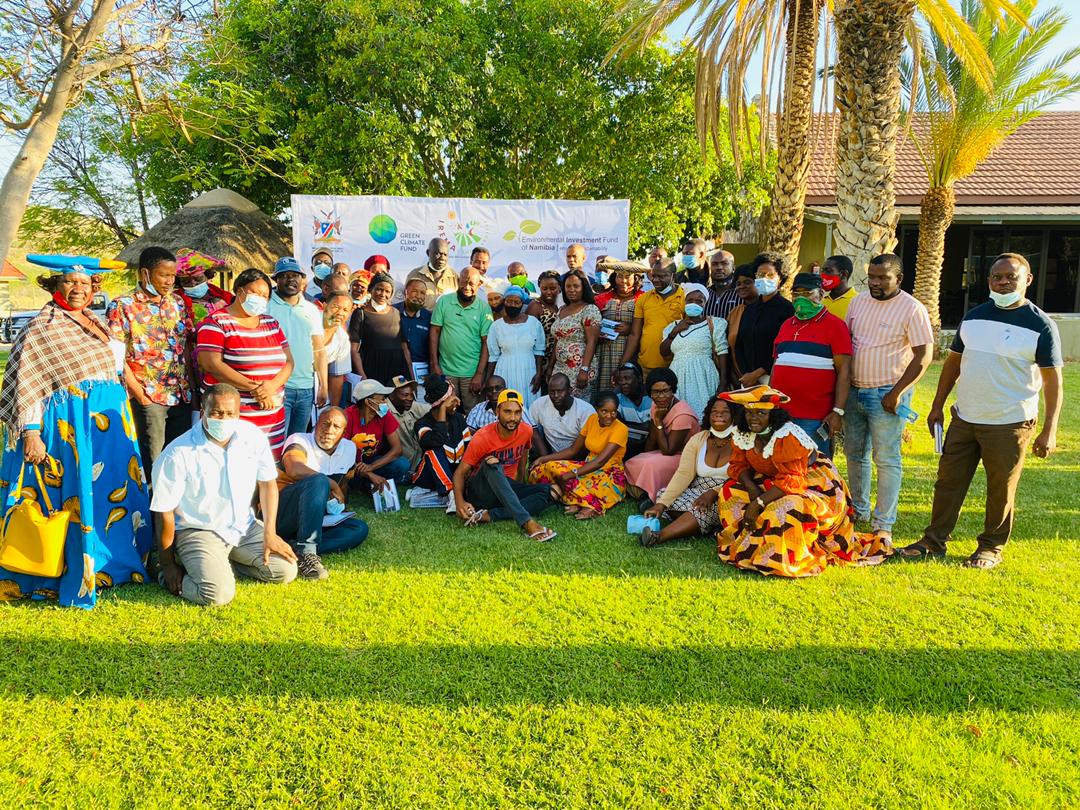
Media Release
THE IREMA PROJECT HOSTS TRAINING OF TRAINERS ON COMMUNITY BASED EARLY WARNING SYSTEM IN KHORIXAS
Khorixas, Tuesday, 26th January 2022 - The IREMA Project hosts Training of Trainers on Community Based Early Warning Systems in Khorixas.
Kunene region, situated in the north-western part of Namibia is one of the most vulnerable region and severely affected by climate-related shocks such as the recurrent droughts. Over the past decade, small-scale farmers in Kunene Region, have endured recurrent drought and flood events that have culminated in the loss of their primary form of livelihoods. Many people living in the Kunene Region depend on livestock farming, community-based natural resource management (conservancy and community forest related tourism) and the use of biodiversity products to meet their daily needs. The natural resource-based livelihoods are vulnerable to climate change to some extent. Namibia continues to observe the ongoing natural variability and changes in rainfall patterns, hence the dominant extreme weather conditions in recent years.
Delivering the welcoming remarks at the training for trainers was the Manager for Corporate Communications at the Environmental Investment Fund of Namibia, Mr. Lot Ndamanomhata highlighted that "In order to be prepared for looming adversities brought about by climate variability, there is a need to shift from being reactive and become more proactive".
Although it is not possible to predict what effect future climate will have, it is of utmost importance to explore and utilise relevant tools that would enable us to capture and disseminate accurate information in order to manage extreme climate risks.
A well-functioning early warning system is an adaptive measure for climate change, which uses integrated communication systems to help vulnerable communities prepare for hazardous climate-related shocks. Such a system comes with wide-ranging benefits such as saving lives and livelihoods, safeguarding productive land and infrastructures, and supports long-term sustainability. This conforms to the mission of the EIF which aims to promote sustainable economic development of Namibia through investment in and promotion of activities and projects that protect and maintain the natural and environmental resources of the country.
The EWS will alert communities under threat of an imminent disaster to undertake proactive actions built upon the four EWS components: (i) hazard detection, monitoring and forecasting; (ii) analysing risks and incorporation of risk information in emergency planning and warnings; (iii) disseminating timely and “authoritative” warnings; and (iv) community planning and preparedness. This will address adaptation needs of smallholder farmers through access to accurate and up-to-date climate information to enhance adaptation responses. This intervention would go a long way in minimising current steps or procedures undertaken before early warning messages reach the intended populations at risk.
The development of an Early warning system tailored for the Kunene Region will not only assist communities and public institutions in their planning, but will also help preserve essential financial resources in the long run, thereby protecting the local and national economy. Early warning information empowers people to take action prior to disasters.
Delivering closing remarks was Mr. Charlie Mwaetako the Chief Scientific Officer, Ministry of Agriculture, Water and Land Reform for the Kunene region who denoted that this training presents the opportunity to communities to be trained on how to implement and maintain an effective EWS, with the objective of strengthening the resilience of local agricultural farming systems for enhanced food and nutrition security in the Kunene Region.
The training commenced Monday, 24th January and concluded Tuesday, 25th February 2022.
About IREMA:
The Environmental Investment Fund of Namibia (EIF), in conjunction with the Ministry of Agriculture, Water and Land Reform (MAWLR), is implementing a Green Climate Fund (GCF) financed project titled: “Improving Rangeland and Ecosystem Management Practices of Smallholder Farmers under Conditions of Climate Change in Sesfontein, Fransfontein, and Warmquelle Areas in Kunene Region (IREMA). Its broad aim is to reduce the vulnerability of smallholder farmers under climate change conditions by safeguarding natural capital that generate ecosystem services to sustain agricultural production systems.
More specifically, the IREMA Project is expected to:
(1) Promote investments in integrated drought early warning systems and improve the existing ones;
(2) Strengthen and improve the capacity of key stakeholders in drought risks management at regional, national and local levels; and
(3) Support communities to undertake innovative adaptation actions that reinforce their resilience to drought.
For more information contact:
Environmental Investment Fund of Namibia (EIF)
Lot Ndamanomhata
Tel: +264 811601846/+264614317706 Email: LNdamanomhata@EIF.ORG.NA
About EIF
The Environmental Investment Fund is Namibia’s own response to the growing global need for green financing. Established in terms of the Environmental Investment Fund Act, Act 13 of 2001 with a mandate to raise funding for investments into projects and programmes that promote sustainable development it is currently one of the fastest growing green and climate financing institutions in Africa. As part of its vision to be “a recognized leader in the development and application of innovative financing mechanisms to support sustainable development and ensuring inclusive development for all the people of Namibia.
Amongst its recognizable impacts to date since inception, the Fund has disbursed grants valued at more than N$ 583 million, ensured that more than 240, 256 hectares of land are under conservation, 71 grants approved for different environmental projects, created more than 950 employment opportunities mostly rural based and include season ones and retrofitted 120 boreholes that benefitted more than 77 000 who now have access to portable drinking water and attracted N$ 820 million for concessional Green Credit Line with participating commercial bank from Agence Française de Développement (AFD) under the SUNREF project in Namibia. To-date attracted and mobilised more than N$1.7 billion mostly from multilateral and developmental funding institutions and partners.
For more information on the EIF visit: http://www.eif.org.na/

